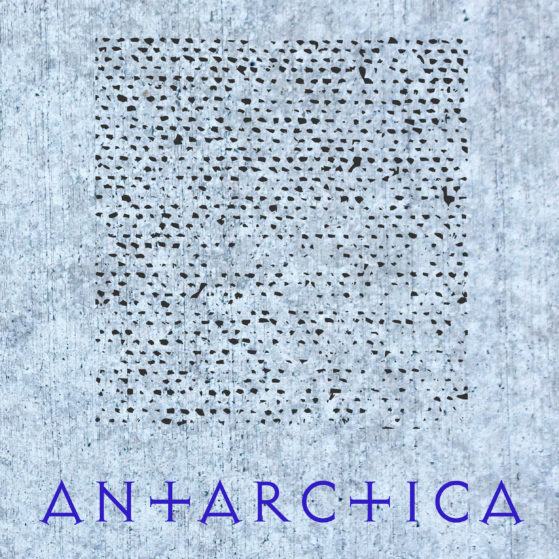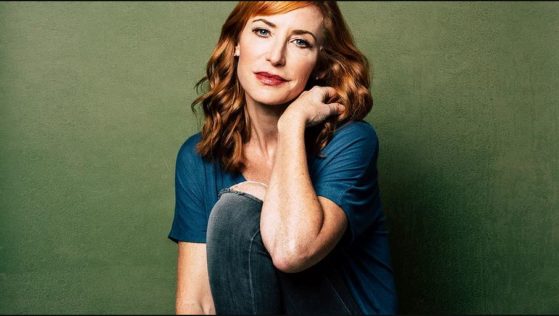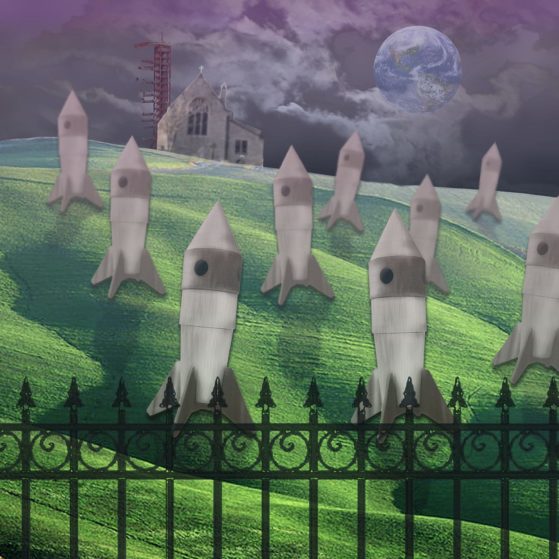KK :: Your CD “Roadstar” combines ambient and rock. Do you think that this is a direction that will continue to grow? Or is it a brief exploration of the two mediums together?
WS :: Fusing ambient, rock, and jazz was never conscious for me. It’s just the way I write. I think I’ll continue this way for a while. I would like to make the guitars harder and the synthesis more prominent and cooler, if that makes sense. I’d like to like to bring a little more cohesion to my next album. I love the way Roadstar visits lots of different places… but in the future may want to visit fewer locations and appreciate the sights at each a little more
KK :: How long have you been playing music? Why did you start?
WS :: The official start was playing my dad’s records in the basement when I was 4 or 5. All kinds of 60’s stuff. I think I found a special connection there… a kind of voice… while it wasn’t really my own, it still was a kind of voice for me. My childhood was not an ideal one, and I’m pretty sure I found refuge there in those grooves. I picked up guitar in seventh grade and keyboards right after. I think I started because I wanted to participate in that fantastical world… the other side… that land where the records come from. The land that saved me!
KK :: In reading your journal (www.williamsteffey.com), you make mention of the unique planetary alignment that recently occurred. Is this an interesting scientific observation or do you believe that there are energetic and emotional repercussions from this? In other words – do you think that the planetary alignment affects human interaction?
WS :: Well, first and foremost it is an interesting scientific observation. As far as songs or things in my journal go, I basically like to put stuff out there and let people attach whatever they’d like to it. I don’t know. What do you think? I don’t really make a definite call on it even for myself. I do think it’s incredibly important that people feel a link to the universe, and celestial events provide this. It’s something the city lights continue to drown out…
KK :: What intrigues you lyrically? What do you write about?
WS :: I like writing about magical worlds that may or may not exist. There are incredible things going on all around us all the time. I’d love it if I could put people in touch with that mystery a little bit more. City of Heroes and Tread are good examples of this. Other times, I write scathing personality assassinations of other people (which are really just demolition derbies of my old selves!)
KK :: “Roadstar” has a transcendent theme for you, which is why you didn’t put the song “Breathing Underwater” on it – because it was about being under water – and “Roadstar” is, as you put it, “the metaphorical ascent from the water”. Can I assume that you are undergoing transformational experiences? And if so, is there anything that you want to say about that?
WS :: I’m definitely subject to transformational experiences all the time. I’m afraid anyone who isn’t is not truly alive. I am aware of these themes in my work but I don’t really choose them… it’s more like the themes choose me. They’re a kind of roadmap to let me know where I am. I think it’s good for everybody to find some creative outlet for just this reason.
For a long time I was stuck on an “ideal vs. real” theme. Then for an even longer time (and there’s still smatterings of this on Roadstar) I was way into “death” themes. Grow Crazy is a violent example of this. But when I say “Your gruesome death is just a formality” it’s very scary, but it’s as natural as a caterpillar entering a cocoon. I’ve recently been writing more about the butterfly, or “resurrection” side of the equation. Like when I say “if you hit the lights just right, Ashland will be green all night” I am talking about a street in Chicago, but am also using Ashland as a codeword for this “life after death” which can be youthfully green if you play your cards right. And when I mentioned ‘demolishing my old selves’ in the last question, I wasn’t talking about some past-life thing… it’s here that we’ve got our different lives, and here that we have to symbolically die and be reborn if we’re to get the most out of our experience.
Excerpt from EDEN…
Despite the fact every object was in its place, there was something very different about the highway that day. The swirling Coca-Cola sign by North Avenue was there as was the Morton’s Salt girl with her usual purple umbrella. It seemed that there was a new light shining down from the sky, as if a new and better sun had come to take the place of the old one. Every street sign, every license plate, every roadside abandoned suitcase flirting trails of underwear and paper- these things were stitched together by the speedometer into a beautiful and elaborate story that was life.
KK :: In addition to writing music, you also write poetry and stories. Do you find that your song lyrics are related to the other literary mediums you pursue? Are the processes linked in any way?
WS :: Yeah. Eden is a primer on synchronicity, basically. The way the fabric of the world fits together immaculately. Pretty amazing stuff. A friend of mine insists “Eden” is my grail and he may be right. Synchronicity is a theme that I explore a lot over Roadstar. It’s a higher level of cognition than we’re used to, and I think it’s one of the prizes of evolution. City of Heroes is all about that. So the same themes do come out in the different media. I’m not sure the processes are all that different. Pen, notebook, blood, sweat, etc…
KK :: Do you have any favorite “unknown” musicians, projects, authors?
WS :: A friend of mine named Michael Cummins is a great songwriter. An artist deserving of a second look would be Thomas Dolby, who too many cast off as the “she blinded me with science” guy. In actuality, he went on to make quite a few great albums after that.
KK :: I used to live in Chicago and would go to poetry readings at Estelle’s Bar. It was an eclectic crowd – hipsters and homeless people alike would take the stage on Tuesday night. Have you ever been to this place? Do you think that poetry lends itself to breaking down social status barriers more so than other mediums – like music?
WS :: I have been to Estelle’s, but never on a Tuesday. You’ve hit on something interesting here. In poetry, genres are less pronounced than in music- so you can get a pretty eclectic audience. The homeless guy, the metalhead, and the hippie all go back to back with their poems but would never be caught dead at the same music venue. Music as of late does tend to reinforce social barriers rather than break them down, but a lot of this is because of the way the industry is set up- Radio formats consciously divide those social groups for the sole purpose of target advertising! (That’s why you’d never hear country next to alt rock next to soft rock.) While the attribute may be dormant, I believe music still has the power to break down social barriers. For some reason lately, people cling to their individuality as if it is all they have that makes them human, when in fact it’s the sameness that makes them so. Who knows. Maybe it will be music that will spark the understanding of that unity. The realization that we’re all one organism is far and away the key to our evolution as a species.
-Karen Kopacz



